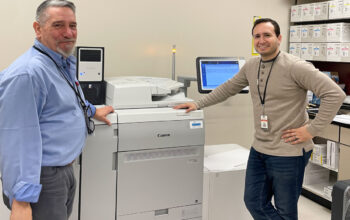httpv://www.youtube.com/watch?v=zAXcBETMwdk&feature=plcp
Video by Marcus Hijkoop & Emilie Kushner
Marcus Hijkoop & Emilie Kushner
Editor-in-Chief & Senior Editor
Last spring, when junior Molly Stine handed in her course-registration form during a hurried gym class, she signed up for Honors Latin V, the course her teacher and guidance counselor had recommended. However, this past August, when she received her eleventh grade schedule, Molly was surprised to find she had been placed into Spanish I instead. Lacking the required student enrollment, the Honors Latin V class, among others, did not run this year.
This year, to fill courses more effectively, class registration was, for the first time, online. Not only did students have more time to select classes through their PowerSchool accounts, introduced last year for online access to grades and attendance, the administration and guidance department now have more accurate computerized data to better facilitate student demand.
According to Principal Bryan Luizzi, “One of the things we’re hoping and expecting is that this system will give us more accurate data right from the start. It’s a student driven schedule, and we’ve had a student driven schedule, but by doing it online we’ve been able to move some of the timelines up for this process. Where parts of it were done over the summer, typically in July or even early August, our goal is to try and have our master schedule at least built before we go at the end of the school year. I think by doing that it will help us to resolve some more conflicts and get students in the classes that they want to take.”
By giving students more time to complete their course registrations, administration is hoping that students will make more informed decisions when deciding what classes to enroll in. “By doing this, what we’re hoping to do is kind of flip it around so that the students have a chance to do some research on their own, look at the courses that are out there, think about what they’d like to take, select those courses online, and then have the conversation with their counselor so that it’s a student driven conversation instead of a canned presentation,” Dr. Luizzi said.
According to Guidance Department Chair, Leslie Miles, “The students have been great and very responsive. I had predicted that we would have an incompletion rate in excess of 10 percent. It was actually much lower than that, maybe six or seven percent only.”
In order to prevent a high incompletion rate, administration made the decision not to have the incoming ninth grade class complete course registration online. Instead, they chose to have 75 percent of students enroll online, in order to resolve any issues they might encounter before having all students do so in the future.
While most hiccups were quickly and easily solved, such as username and password discrepancies, some students encountered problems while appealing for courses. “I thought it was generally smooth, but when appealing for different courses, it takes awhile for you to get it all in,” sophomore Olivia Harkey said. “If you don’t have one part of the appeal then you have to start all over again because it doesn’t save your work.”
Sophomore Stefan Pla also found that, “If you had been recommended for an honors class, and you wanted to opt out of that class and take the regular class instead, then you weren’t able to do that. You have to send in your request form with that class to your guidance counselor and have them change it for you.”
While freshman Shaan Appel did not experience many technical difficulties, he considered classes that may not be able to run next year. “A couple of the bumps were mainly just in courses that I wanted to take that weren’t offered,” he said. “I’ll be testing into Spanish II next year, and for that, you have to talk to your guidance counselor. I also know there are some systems with the Orchestra and Engineering electives, trying to get those into 1 semester instead of yearlong courses, otherwise there’s a possibility they’re not going to roll.”
However, the guidance counselors are very quick to remind students that even if a class doesn’t run one year due to a lack of numbers, it can still be offered in the future. “This really isn’t any different than any other year; going electronically didn’t change this process,” Ms. Miles said. “If there is insufficient demand for a course, the course is not offered. Considering the fact that we don’t have infinite faculty here, we have to use our resources where there is the most demand.”
Guidance Counselor Susan Lenci agreed. “I think it’s worth noting that, we, the administration and the scheduling system, are responsive to the students based on what we know the students need,” she said. “If enough students express demand, there probably will be some attention paid to that. But it’s a big puzzle of allocating the staff and the rooms and all of the things in scheduling thirteen hundred plus students.”
Dr. Luizzi further emphasized the importance of keeping classes in the program of studies. “What we do, which I believe in, is, when classes don’t run, we don’t remove them from the course of studies,” he said. “Sometimes in a course like an AP language course or even a language that doesn’t have generally high enrollment in the level that comes before, we may not be able to run a course every single year. So absolutely, if a course doesn’t run like that – if any course doesn’t run – the following year if people are still interested it will be there for them to select.”
“One of the things we always try to do is offer the most opportunities for students that we can,” Dr. Luizzi said. “One of the ways we can do that is by having a very expansive program of studies to choose from. But, as thirteen hundred students go through each year, some of those courses will come and go, depending on where the student body stands at any given time.”
However, if a class is consistently unable to run, it may be reconsidered and dropped from the course of studies. In the past this has happened with courses such as German. According to Ms. Miles, “The dropping of any course is not necessarily sudden, nor an easy decision. German was dropped because the demand was not there from students.”
According to World Languages Department Chair Dr. Lisa Arbués, “[German] was a very small program. It really wasn’t doing terribly – we had a faithful following – but it was very small. Generally speaking, administration tries to offer three years in the same language for our students. Well, once those kids were through their three years, and we weren’t getting enough signing up in level one and two, it just phased out.”
The World Languages Department currently offers classes of varying levels in Chinese, French, Latin and Spanish, with the most students currently enrolled in the latter. “French, Latin and Chinese can be very difficult decisions at times,” Dr. Arbués said. “There’s sometimes very small enrollment depending on level, whether it’s an honors section or a regular section. Those are decisions that I work with the administration to make.”
While, according to Dr. Luizzi, administration generally uses a requirement of at least 12 students per class, “[The World Languages Department] has often been told something more like 14 as being a rule of thumb for trying to run a class, not to say that we haven’t seen many classes run smaller, but it has often been a real challenge to offer all the sections we would like to,” Dr. Arbués said. “We often struggle to have students understand that everything that’s in the course of studies guide is offered – it’s just a question of whether it can run or not, depending on numbers.”
However, many students believe that exceptions should be made for certain classes. “I think there should be exceptions for AP classes and more advanced class, because in a small environment individualized attention is definitely important and it is also important to give people the opportunity to develop in places they excel, like an AP atmosphere,” Shaan said.
Freshman Kenon Lysenko agreed. “Exactly, because in some of the smaller classes, if you have less people then you’re most likely able to get through more [material].”
Some students believe that exceptions should not be limited to higher level classes, but for all courses that could still function effectively and even benefit from smaller class sizes. “I think the school should give the students a chance because, from class to class, the need changes,” Molly said.
In the past, administration and departments, including the World Languages department, have worked together to try to find alternatives for smaller groups of students interested in pursuing certain subjects. “Already quite a few students have been able to pursue languages through our independent studies program, and we actually have Rosetta Stone set up in the lab for those students,” Dr. Arbués said.
This year, the World Languages department has also utilized Livemocha, an online language learning community with over 12 million registered members that provides instructional material in 38 languages. “Livemocha is something that we are definitely piloting this year,” Dr. Arbués said. “It’s very helpful for students who want to study something that we can’t offer, either as support outside of class, but also to pursue a language that we can’t offer in class because we don’t have enough students. I think sometimes we’ve got to get creative.”



